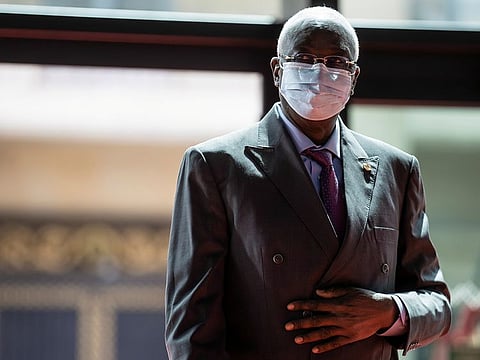Mali: Military detain president, prime minister, defence minister
Chaos deepens months after military coup ousted previous president,

Bamako: Military officers in Mali detained the president, prime minister and defence minister of the interim government on Monday, deepening political chaos just months after a military coup ousted the previous president, multiple sources told Reuters.
President Bah Ndaw, Prime Minister Moctar Ouane and defence minister Souleymane Doucoure were all taken to a military base in Kati outside the capital Bamako, hours after two members of the military lost their positions in a government reshuffle, the diplomatic and government sources said.
Their detentions followed the ousting by the military in August of President Ibrahim Boubacar Keita. The development could exacerbate instability in the West African country where violent Islamist groups linked to Al Qaida and Daesh control large areas of the desert north.
Political instability and military infighting have complicated efforts by Western powers and neighbouring countries to prop up to the impoverished nation, contributing to regional insecurity.
The United Nations’ mission in Mali called for the group’s “immediate and unconditional” release and said those who hold the leaders would have to answer for their actions.
A delegation from the top regional decision-making body ECOWAS will visit Bamako on Tuesday to help resolve the “attempted coup”, ECOWAS, the UN, African Union, European Union and several European countries said in a joint statement.
“The international community rejects in advance any act imposed by coercion, including forced resignations,” the group said.
Ndaw and Ouane had been tasked with overseeing an 18-month transition back to civilian rule after the August takeover, but they appear to have moved against the military’s control over a number of key positions.
“The sacking of the pillars of the coup was an enormous misjudgement,” a senior former Malian government official said.
“The actions are probably aimed at getting them back in their jobs.” The military’s ultimate goal was not immediately clear. One military official in Kati said this was not an arrest.
“What they have done is not good,” the source said, referring to the cabinet reshuffle.
“We are letting them know, decisions will be made.” Kati’s military base is notorious for ending the rule of Malian leaders. Last August, the military took President Keita to Kati and forced him to resign. A mutiny there helped topple his predecessor Amadou Toumani Toure in 2012.
Mali has been in turmoil ever since. Toure’s departure triggered an ethnic Tuareg rebellion to seize the northern two-thirds of the country, which was hijacked by Al Qaida-linked extremists.
French forces beat the insurgents back in 2013 but they have since regrouped and carry out regular attacks on the army and civilians. They have exported their methods to neighbouring Burkina Faso and Niger where attacks have skyrocketed since 2017.
There had appeared to be some cause for optimism. The transitional government said last month that it would hold legislative and presidential elections in Feb. 2022 to restore a democratic government.
“It is regrettable, but not surprising: the arrangement agreed to after the coup last year was not perfect, but it was a compromise agreed to by all the major Malian and international stakeholders,” said J. Peter Pham, former US special envoy for the Sahel, now with the Atlantic Council, told Reuters.
Sign up for the Daily Briefing
Get the latest news and updates straight to your inbox







